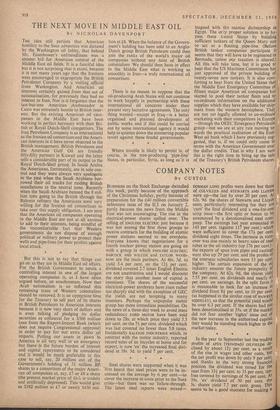THE NEXT MOVE IN MIDDLE EAST OIL
BY NICHOLAS DAVENPORT
THE idea still persists that American hostility to the Suez adventure was dictated by the Washington oil lobby, that behind Mr. Eisenhower's unfriendliness was a sinister bid for American control of the Middle East oil fields. It is a fanciful idea but it is not surprising that it exists, because it is not many years ago that the Iranians were encouraged to expropriate the British Petroleum Company by a visiting official from Washington. And American oil interests certainly gained from that act of nationalisation, for previously they had no interest in Iran. Nor is it forgotten that the last-but-one American Ambassador in Cairo was extremely hostile to British inter- ests. But the existing American oil com- panies in the Middle East have been working in perfect harmony with their Bri- tish or Royal Dutch-Shell competitors. The Iraq Petroleum Company is as international as the Iranian oil consortium and the Ameri- can interests in it have never objected to the British management. Witish Petroleum and the American Gulf Oil are friendly fifty-fifty partners in Kuwait and the latter sells a considerable part of its output to the Royal Dutch-Shell group. In Saudi Arabia the Americans, fortunately, are in sole con- trol and they were always very apologetic in the past when the Saudi Arabians bor- rowed their oil trucks for raiding British installations in the neutral zone. Recently when the Saudi Arabians banned the 8 mil- lion tons going to the British through the Bahrein refinery the Americans were very willing for the Iranian oil consortium to take over this supply obligation. I am sure that the American oil companies operating in the Middle East are not at all anxious to add to their interests, being mindful of the uncomfortable fact that Western governments do not dispose of enough political or military power to protect their wells and pipe-lines (or their profits) against local attack.
* * *
But this is not to say that things can go on as they are in Middle East oil affairs. For the British Government to retain a controlling interest in one of the largest operating companies is, as I have often argued before, an anachronism. Now that Arab nationalism is so inflamed this remaining trace of Western colonialism should be removed. It is an opportune time for the Treasury to sell part of its shares in British Petroleum to American interests because it is now very short of dollars and is even talking of pledging its dollar securities as collateral for a $500 million loan from the Export-Import Bank (which does not require Congressional approval) in order to pay for our extra dollar oil imports. Putting our ' assets in pawn to America is all very well in an emergency but there is the future burden of interest and capital repayments to be considered and it would be much preferable in this case to sell, say, 20 million out of the Government's holding of 51 million BP, shares to a consortium of the major Ameri- can oil companies at, say, £7 or £8 a share (the present market price of £616 is unduly and artificially depressed). This would give us $392 million at £7 or nearly $450 mil-
lion at £8. When the balance of the Govern- ment's holding has been sold to an Anglo- Dutch group British Petroleum could then join the ranks of the world's major oil companies without any taint of British colonialism. We should then have in effect in the Middle East what is working so smoothly in Iran—a truly international oil consortium.
* * *
There is no reason to suppose that the oil-producing Arab States will not continue to work happily in partnership with these international oil concerns under their present very lucrative agreements. The only thing wanted—except in Iraq—is a better organised and planned development of public works and if this could be carried out by some international agency it would help to quieten down the simmering popular revolt against these feudal governments.
Where trouble is likely to persist is, of course, in the non-producing 'pipe-line' States, in particular, Syria, as long as 'it is
leagued with tht maniac dictatorship in Egypt. The on ly proper solution is to by- pass these wans.it States by building sufficient tankers of the Queen Mary size to act as a floating pipe-line. (Before British tanker companies participate it seems that they will have to be registered in Bermuda, unless our taxation is altered.) All this will take time, but it is good to hear that the US Maritime Commission has just approved of the private building of twenty-seven new tankers. It is also com- forting to hear from the United States that the Middle East Emergency Committee of fifteen major American oil companies has started to pool their tanker fleets and to co-ordinate information on the additional supplies which they have available for ship- ment from the western hemisphere. They are not yet legally allowed to co-ordinate marketing with their competitors in Europe —through the OEEC Emergency Petroleum group—but we are at any rate moving to- wards the practical realisation of the East- West oil bank which I have previously sug- gested, that is, if we could only come to terms with the American Government over the dollar credits. That is why I am sure this is the right time to bring up the sale of the Treasury's British Petroleum shares.


































 Previous page
Previous page